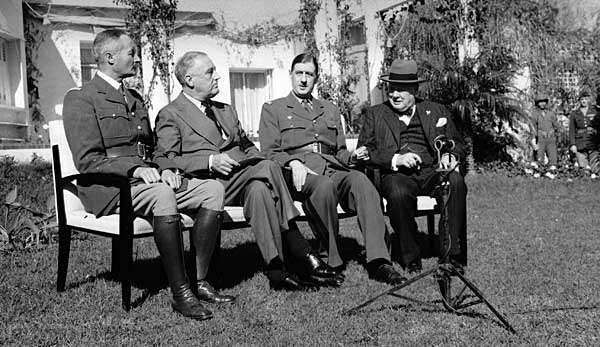
Allied leaders (from left) French General Henri Giraud, U.S. President Franklin D. Roosevelt, French General Charles de Gaulle, and British Prime Minister Winston Churchill at the Casablanca Conference, January 1943. U.S. Army Photo. The work of the conference was primarily military—deciding on the invasion of Sicily (after completion of the North African campaign) rather than an immediate invasion of western Europe, apportioning forces for the Pacific theatre and outlining major lines of attack in the Far East, and agreeing on the concentrated bombing of Germany. Roosevelt and Churchill also found time to discuss nuclear bomb research, to consider competing claims between Henri Giraud and Charles de Gaulle for the leadership of the French war effort against the Axis powers, and, most important of all, to demand an “unconditional surrender” from Germany, Italy, and Japan. For more information, go to the Encyclopedia Brittanica website by clicking this link.
By: Phil Kohn. Dedicated to the memory of his father, GM3 Walter Kohn, U.S. Navy Armed Guard, USNR, and all men and women who have answered the country’s call in time of need. Phil can be contacted at ww2remembered@yahoo.com.
The British Eighth Army begins a new push in Libya on January 15. In Yugoslavia, German, Italian and Croat forces under Gen. Alexander Löhr launch “Operation White,” the biggest campaign to date against anti-Axis Yugoslav Partisans led by Josip Broz, known as Tito. Most Partisans captured, including the wounded, are executed on the spot. In Washington, D.C., construction of the Pentagon is completed after only 16 months. Covering 29 acres, it’s the world’s largest office building.
On January 16, the British Eighth Army destroys Rommel’s rearguard at Buerat, Libya, and is now just 300 miles from the Tunisian frontier. Iraq enters the war against all three Axis powers. RAF Bomber Command renews its attacks on Berlin after a 14-month lull.
At the Casablanca Conference on January 17, the British want to keep fighting in the Mediterranean before any main attack is made on Europe via the English Channel. They propose invasions of Sicily and Italy, which they feel will precipitate the fall of Mussolini, as well as drawing German reserves away from France and the Low Countries. The British also want to establish air bases in Italy, from which German armaments factories and Romanian oil-producing facilities can be bombed. The Americans, on the other hand, believe that the proposed British plan will only dissipate resources for a cross-Channel invasion, and tie up forces in what they feel will be a sideshow. The Americans believe the quickest way to defeat Hitler is by an invasion of northern France. Both sides agree, however, that a cross-Channel invasion will not be possible in 1943, and the Americans grudgingly accept the British proposal for an invasion of Sicily.
On January 18, Jews in Warsaw, Poland, revolt against the Nazis by firing on the Germans with small arms in what is the beginning of the Warsaw Ghetto Uprising. The Jewish resistance is triggered by the resumption of deportations to the Treblinka extermination camp, which had been suspended since October 1942. In northern Russia, the Red Army breaks through the 515-day German siege of Leningrad from the east and opens a 6- to 7-mile-wide land corridor by which to relieve the city and start bringing in supplies. In the U.S., bread and certain metals are rationed. The sale of pre-sliced bread is banned, to reduce the need by bakeries for metal parts for bread-slicing machines.
The Soviets on January 19 claim victories during a 75-mile advance towards Kharkiv, Ukraine, stating that some 52,000 Axis prisoners have been captured on this front alone.
In North Africa, the British Eighth Army on January 20 solidifies its position in Homs, Libya, while Rommel’s Panzerarmee Afrika continues its retreat toward Tunisia. In South America, Chile breaks off diplomatic relations with the Axis countries. A daytime raid by the Luftwaffe on a London suburb hits a school in session, killing 41 children and 6 teachers. A sweep by combined German, Italian, Chetnik, and Ustaše forces is begun against Yugoslav Partisans; the Tito-led Partisans are forced into southern Bosnia.
American and Australian troops attack near Buna, Papua-New Guinea, on January 21. The Japanese make a stand, but are defeated. The Australians and the Americans pour onto the northern coast of Papua-New Guinea and move northward towards Japanese positions at Lae and Salamaua. Hundreds of Jews are killed in the Warsaw Ghetto as German soldiers, responding to the revolt, begin throwing grenades into buildings where people are living.







